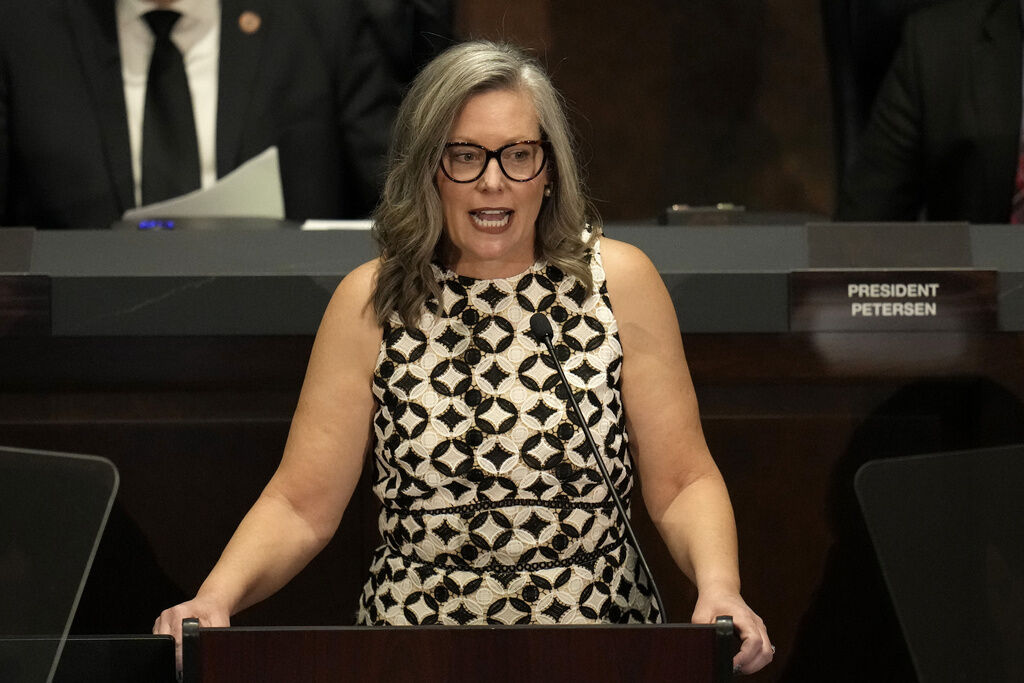PHOENIX — Democratic Gov. Katie Hobbs acknowledged Friday she really didn’t get anything out of the deal she cut with Republican lawmakers to resolve election deadline issues.
Instead, she said, she just prevented the package pushed by Republicans from getting any worse, at least from her perspective. “This bill is the result of a lot of compromise,’’ Hobbs said.
The final version Hobbs signed Friday gives GOP lawmakers two of their key demands.
Most significantly, the governor agreed to put into law standards that county election officials must use when verifying the signatures on early ballot envelopes. Hobbs had wanted that to remain in guidance issued by the Secretary of State’s Office, something that could be altered without legislative approval.
In fact, just last year she vetoed a measure to put the standards into law.
The new package also shortens the amount of time voters whose signatures do not match have to “cure’’ their ballots. Those voters had been given until the Tuesday after the election, a deadline Democrats wanted to preserve. Now the fixes need to be done by Sunday.
But Hobbs said that change does ensure county election offices will have to remain open on the weekend following the election.
As for the fix to election deadline problems that also was sought by the Republican-controlled Legislature, Hobbs said: “It ensures that our overseas and military voters are going to get their ballots on time.”
That’s because it moves up the primary election by a week to ensure there are final results that allow counties to prepare ballots for Arizonans who are not in the country and get them back ahead of the Nov. 5 general election.
It also tightens up time frames after the general election to ensure the state can get its result in the presidential contest to Congress by the Dec. 11 deadline in federal law “so that Arizona’s electoral votes will count.’’
One thing Hobbs and Democrats wanted and did not get is repeal of a 2022 law that increased the margin of difference between candidates to force a recount.
It had been 0.1%. But Republican lawmakers pushed through a bill that year, signed by Republican then-Gov. Doug Ducey, to boost that to 0.5%.
The number is significant. Joe Biden beat Donald Trump in 2020 in Arizona by 10,457 votes, more than enough to avoid a recount under the old law but a margin that would trigger a recount in the future under the new law.
Hobbs said the change occurred because GOP lawmakers were “following down conspiracy theory rabbit holes” about the election.
That change — and the possibility of more recounts in future elections — is what led county election officials to conclude they could not get everything done they needed to do and meet all deadlines.
Republicans were adamant against rescinding the 2022 law. That forced a series of other changes, including moving the state primary up by a week this year, to July 30, and tightening up other deadlines.
What her role came down to, Hobbs said, is mitigating the damages she thought would be done if Republicans got everything they wanted.
“A lot of folks where trying to make it a Christmas tree and attach a bunch of unrelated items to it,’’ she said, meaning changes in election law not needed to resolve the immediate deadline problem created by the recount law.
One of those things Hobbs said she was able to quash was a bid by Republicans to permanently move the state’s primary to May beginning in 2026.
“There’s no reason to move the deadline that far to fix this issue,’’ she said. “The best fix would be to repeal the recount threshold.’’
Asked why she thinks GOP lawmakers wanted the primary in May, Hobbs answered, “To have more leverage while the Legislature is still in session during an election year.” She did not elaborate.
But Senate President Warren Petersen, a Gilbert Republican, said, “Will we have to move it up again to avoid future problems.”
“All that has been resolved is 2024,’’ he said of moving up the primary by a week but only for this year.
House Speaker Ben Toma agreed, saying a “permanent fix’’ is needed.
“The governor appears to want to leave this unresolved for future cycles, which is something I don’t understand,’’ said the Peoria Republican. “But we took care of this for now, so that’s a win.’’
The history of politics in Arizona could provide a clue why the GOP wanted the May date. Republican primaries often are high-profile and highly divisive affairs. Getting a decision in May of who will be the party’s candidate gives more time for those wounds to heal.





